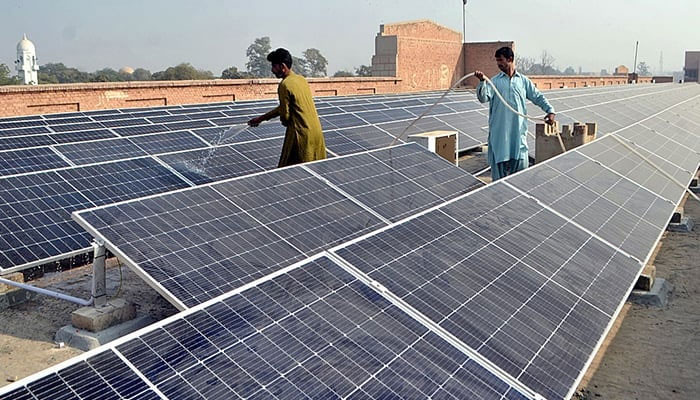Solar PV manufacturing policy need of hour: experts
Experts highlighted the increasing demand for renewable energy in Pakistan
ISLAMABAD: Pakistan has imported over 10 GW of solar capacity in 2024, highlighting the urgent need for a solar PV manufacturing policy.
This disclosure was made in a consultative session titled “Shaping the Future of PV Panel Manufacturing in Pakistan: Insights into Supply Chain, Financing, and Technology Transfer Opportunities”. The session was arranged by the Renewables First in collaboration with the USPCAS-E NUST. Experts highlighted the increasing demand for renewable energy in Pakistan, noting that over 10 GW of capacity had already been imported in 2024. Dr Tahir Azhar from the MaxPower emphasized the significant potential for solar PV manufacturing in Pakistan, which was contingent on the early adoption of a solar PV manufacturing policy.
Ali Majid, general manager of Longi, shared that Chinese investors and manufacturers were increasingly interested in Pakistan due to the country’s high potential and the slowing growth within China, prompting investors to seek overseas opportunities. Ahmed Ammar Yasser from the PFAN also underscored the importance of building partnerships with China, particularly given the global geopolitical shifts driving Chinese investors away from the West. He suggested that these investors might reroute their exports through Pakistan by shifting their industry here. Moreover, he emphasized the need to focus on ancillary components of solar PV, which might be easier to localize in the short term. He particularly noted that global developments in battery manufacturing were taking off, making this the ideal time for Pakistan to enter this space as early as possible.
Providing an update on the progress of the existing Solar PV Manufacturing Policy, Aqeel Hussain Jafri, director of policy at PPIB, stressed the need to further refine the policy to ensure its alignment with other relevant policies, such as tax laws, and comprehensively cover long-term financing support mechanisms. Dr Khalid Waleed from the SDPI said the policy should include incentives, tax grants and subsidies to give Pakistan a competitive advantage internationally.
Discussing the financing outlook for the manufacturing industry in Pakistan, Abid Kitchlew, VP of National Bank of Pakistan, emphasized the need for government support to ensure liquidity for lending to manufacturing projects. He highlighted innovative financing strategies such as tax rebates for lenders and suggested introducing policy instruments that required local PV systems for public sector solarization programs, as opposed to directly subsidizing the private sector. Saqib Zaidi, chief operating officer at REON Energy, pointed out that local manufacturing became competitive with a 30% subsidy or financing support mechanisms.
-
 EU Leaders Divided Over ‘Buy European’ Push At Belgium Summit: How Will It Shape Europe's Volatile Economy?
EU Leaders Divided Over ‘Buy European’ Push At Belgium Summit: How Will It Shape Europe's Volatile Economy? -
 Prince Harry, Meghan Markle Issue A Statement Two Days After King Charles
Prince Harry, Meghan Markle Issue A Statement Two Days After King Charles -
 'The Masked Singer' Pays Homage To James Van Der Beek After His Death
'The Masked Singer' Pays Homage To James Van Der Beek After His Death -
 Elon Musk’s XAI Shake-up Amid Co-founders’ Departure: What’s Next For AI Venture?
Elon Musk’s XAI Shake-up Amid Co-founders’ Departure: What’s Next For AI Venture? -
 Prince William, King Charles Are Becoming Accessories To Andrew’s Crimes? Expert Explains Legality
Prince William, King Charles Are Becoming Accessories To Andrew’s Crimes? Expert Explains Legality -
 Seedance 2.0: How It Redefines The Future Of AI Sector
Seedance 2.0: How It Redefines The Future Of AI Sector -
 Andrew Mountbatten-Windsor Still Has A Loan To Pay Back: Heres Everything To Know
Andrew Mountbatten-Windsor Still Has A Loan To Pay Back: Heres Everything To Know -
 US House Passes ‘SAVE America Act’: Key Benefits, Risks & Voter Impact Explained
US House Passes ‘SAVE America Act’: Key Benefits, Risks & Voter Impact Explained -
 'Heartbroken' Busy Philipps Mourns Death Of Her Friend James Van Der Beek
'Heartbroken' Busy Philipps Mourns Death Of Her Friend James Van Der Beek -
 Gwyneth Paltrow Discusses ‘bizarre’ Ways Of Dealing With Chronic Illness
Gwyneth Paltrow Discusses ‘bizarre’ Ways Of Dealing With Chronic Illness -
 US House Passes Resolution To Rescind Trump’s Tariffs On Canada
US House Passes Resolution To Rescind Trump’s Tariffs On Canada -
 Reese Witherspoon Pays Tribute To James Van Der Beek After His Death
Reese Witherspoon Pays Tribute To James Van Der Beek After His Death -
 Halsey Explains ‘bittersweet’ Endometriosis Diagnosis
Halsey Explains ‘bittersweet’ Endometriosis Diagnosis -
 'Single' Zayn Malik Shares Whether He Wants More Kids
'Single' Zayn Malik Shares Whether He Wants More Kids -
 James Van Der Beek’s Family Faces Crisis After His Death
James Van Der Beek’s Family Faces Crisis After His Death -
 Courteney Cox Celebrates Jennifer Aniston’s 57th Birthday With ‘Friends’ Throwback
Courteney Cox Celebrates Jennifer Aniston’s 57th Birthday With ‘Friends’ Throwback




